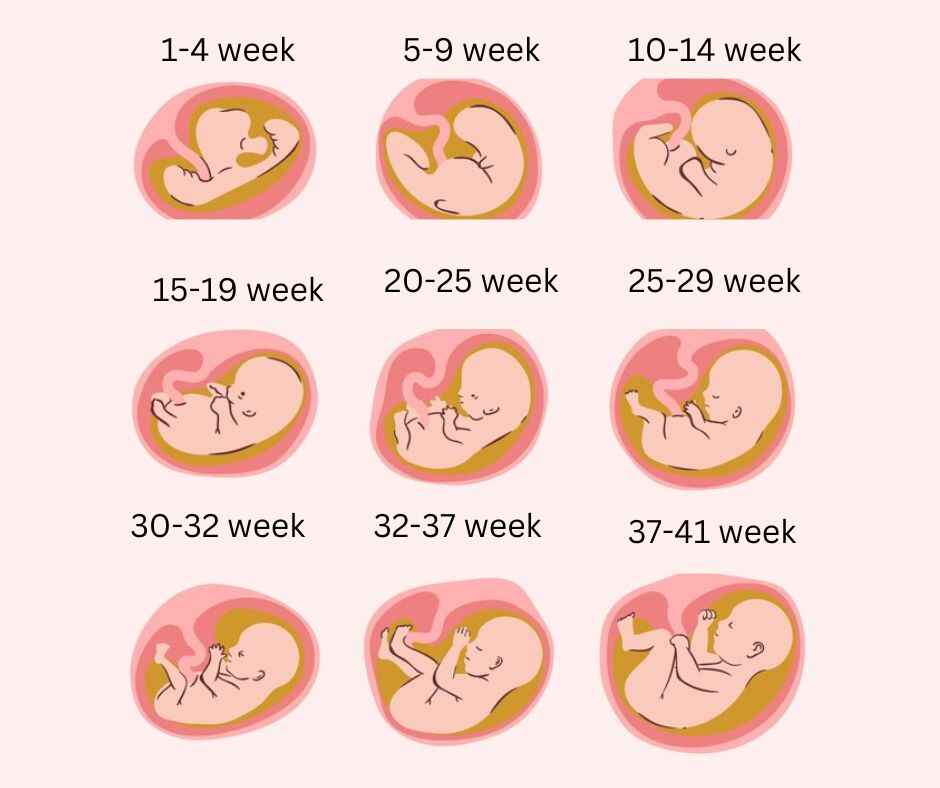Are You Serious About Your Pregnancy at Six Weeks? This Article Covers Every Aspect: Baby Growth, Activity, Symptoms, and Do’s and Don’ts.
Table of Contents
Today, let’s talk about pregnancy. According to the week count, it’s the Pregnancy Six Week. This week is very important because a lot of changes start happening in your baby. The embryo in your womb is about five to six millimeters or about 0.25 inches long at this time. The baby’s facial features, nose, mouth, and ears begin to take shape gradually.
Baby’s Development: Insights into Pregnancy Six Week
Let’s learn about some important things regarding the growth of the baby during the Pregnancy Six Week.
During the Pregnancy Six Week, the baby’s head grows relatively larger, and you may notice dark spots or dots where the baby’s eyes and nose are forming. There’s a bit of a bulge on each side of the head where the baby’s ears begin to take shape. At this stage, the baby looks like a tiny grain of rice, gradually transforming into hands and feet. Inside the small mouth of the embryo, the formation of the palate and vocal cords begins.

At this time, the heartbeat is about 160 beats per minute, almost double that of an adult. By the eighth week of pregnancy, the baby’s heartbeat may be heard on ultrasound, but it can sometimes be heard as early as the fifth week through vaginal ultrasound. After the formation of the heart tube, it starts circulating blood throughout the baby’s body. The process of forming internal organs also begins at this time. The kidneys and respiratory system start forming in specific places in the small body. The embryo’s spine extends outside the body and resembles a thread, which will fuse together over the next few weeks.
Understanding Maternal Physical Changes: Common Symptoms in Week Six of Pregnancy
During pregnancy, mothers may experience some symptoms. For example, feeling tired is common this week because a lot of the mother’s energy is spent on the baby’s development. Although mood swings and fatigue are common during pregnancy due to hormonal changes, there are other reasons as well. Irregular sleep patterns can cause fatigue throughout the pregnancy. Especially at this time, mild discomfort in the back and spine might lead to frequent trips to the restroom, disrupting good sleep. Also, not getting enough sleep at night can lead to feeling down or tired throughout the day.
Mood swings: Some behavioral changes may occur in pregnant mothers this week. Sometimes a mother might become overly emotional, while other times she might become irritable or anxious about pregnancy symptoms. Due to various pregnancy symptoms, different reactions can occur in different individuals. Many times, excessive emotions can surface, and pregnant mothers may express heightened feelings in response to significant or minor changes related to pregnancy.

On the other hand, some mothers may experience excessive anxiety or agitation, or pregnancy-related hopelessness or depression. Additionally, increased frequency of urination, feeling nauseous or vomiting, or experiencing morning sickness may be observed frequently.
Some mothers may experience headaches during pregnancy. However, in that case, it’s important to take enough rest instead of suddenly taking medication. Drinking plenty of water, bathing in warm water, or gently massaging the head can be helpful. But remember, if a mother doesn’t notice any changes within herself, there’s no need to worry too much. Not everyone experiences all kinds of symptoms during pregnancy, it varies.
Do’s and Don’ts for Pregnancy Week 6
Now let’s discuss what can be done this week since it’s the time for significant developments in the baby’s growth. So, start avoiding unhealthy foods from now on. Be cautious about any kind of medication and consult a specialist before taking any medication to ensure its safety during pregnancy. According to the National Women’s Health Information Center in the United States, a pregnant woman should intake about 400 micrograms of folic acid daily. Many foods contain folic acid, such as leafy greens, broccoli, lettuce, citrus fruits, lentils, liver, beans, peas, etc.
It’s advisable to consume less coffee, tea, or soda and even avoid them altogether. Pregnant women should include more protein, folic acid, and iron-rich foods in their daily diet than usual to support the growing baby in the womb.
During this time, avoid eating junk food. Fruits and vegetables are more appealing than junk food. Many pregnant women suffer from constipation, try to stay away from constipation by eating fruits and vegetables. During this time, start eating small amounts of food instead of eating a lot at once, so you won’t lose your appetite, and you’ll feel a bit relieved to eat something. Try to eat six to twelve small meals or snacks instead of three large meals a day. This helps reduce gas, acidity, and the feeling of nausea.
If there is a lack of vitamins and minerals in the mother’s body during pregnancy, it can affect the baby’s body too. So, you can consult a doctor to take extra mineral and vitamin-rich supplements.
Read Also: Pregnancy Week Five.
